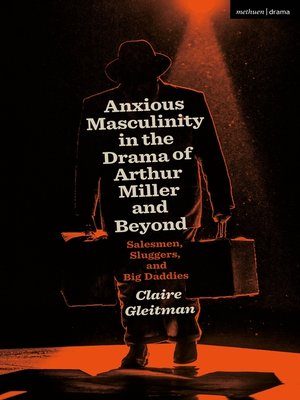Anxious Masculinity in the Drama of Arthur Miller and Beyond
ebook ∣ Salesmen, Sluggers, and Big Daddies · Modern Studies in European Law
By Claire Gleitman

Sign up to save your library
With an OverDrive account, you can save your favorite libraries for at-a-glance information about availability. Find out more about OverDrive accounts.
Find this title in Libby, the library reading app by OverDrive.



Search for a digital library with this title
Title found at these libraries:
| Library Name | Distance |
|---|---|
| Loading... |
Staunchly homosocial, vaguely or overtly misogynistic, anxiously homophobic-this study follows the male breadwinner as he is incarnated in Arthur Miller's most celebrated plays and as he resurfaces in different guises throughout American drama, from the 1950s to the present.
Anxious Masculinity offers a compelling analysis of gender dynamics and the legacy of this figure as he stalks through the works of other American dramatists, and argues that the gendered anxieties exhibited by their characters are the very ones invoked with such success by Donald Trump.
Claire Gleitman examines this figure in the plays of Miller and Tennessee Williams, as well as later 20th-century writers Lorraine Hansberry, August Wilson, and Sam Shepard, who reposition him in more racially and economically marginalized settings. He reappears in the more recent work of playwrights Tony Kushner, Paula Vogel, and collaborators Lisa Kron and Jeanine Tesori, who shift their focus to the next generation, which seeks to escape his clutches and forge new, often gleefully queer identities.
The final chapter concerns contemporary Black dramatists Suzan Lori-Parks, Jackie Sibblies Drury, and Jeremy O. Harris, whose plays move us from anxious masculinity to anxious whiteness and speak directly to the current moment.
Anxious Masculinity offers a compelling analysis of gender dynamics and the legacy of this figure as he stalks through the works of other American dramatists, and argues that the gendered anxieties exhibited by their characters are the very ones invoked with such success by Donald Trump.
Claire Gleitman examines this figure in the plays of Miller and Tennessee Williams, as well as later 20th-century writers Lorraine Hansberry, August Wilson, and Sam Shepard, who reposition him in more racially and economically marginalized settings. He reappears in the more recent work of playwrights Tony Kushner, Paula Vogel, and collaborators Lisa Kron and Jeanine Tesori, who shift their focus to the next generation, which seeks to escape his clutches and forge new, often gleefully queer identities.
The final chapter concerns contemporary Black dramatists Suzan Lori-Parks, Jackie Sibblies Drury, and Jeremy O. Harris, whose plays move us from anxious masculinity to anxious whiteness and speak directly to the current moment.







